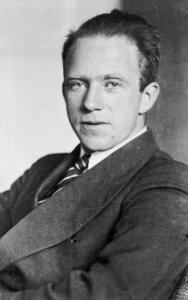SciTech Tuesday: Werner Heisenberg–good or bad? It’s uncertain.
Werner Heisenberg was born on December 5th 1901. The co-founder and pioneer of quantum mechanics was born to parents in Bavaria, where his father taught and studied classical languages. In his youth Heisenberg was a member of the German Youth Movement, and showed aptitude for both mathematics and physics. A Rockefeller Foundation fellowship took him to Copenhagen for a year in 1924 to conduct research with Niels Bohr. Returning to Germany, he developed the first parts of the quantum theory with collaborators. In 1926 Heisenberg returned to Copenhagen and work with Bohr, as a lab assistant and lecturer.
In 1927 Heisenberg wrote to his colleague Wolfgang Pauli about what came to be called the uncertainty principle. He moved to Leipzig as a professor that same year. Shortly after he wrote papers with Pauli describing relativistic quantum theory, and in 1932 Heisenberg was awarded the Nobel Prize for Physics.
With the rise of fascism and anti-semitism in Germany, quantum physics and all theoretical physics, including relativity, were derided. Reports in the press referred to Heisenberg as ‘white jew.’ Political forces were set on denying academic advancement to Heisenberg. Just before the outbreak of the war, in 1939, he visited the United States, and refused an invitation to emigrate. Heisenberg’s mother was friends with Himmler’s mother, and she made an appeal. Himmler wrote a letter supporting Heisenberg, saying that Germany could not afford to lose or silence a man it needed to educate a generation of scientists, and signed it ‘in friendship, Heil Hitler.’ Privately, Himmler warned Heisenberg to be cautious.
Right after Meitner and Frisch explained the experimental results that showed the fission of uranium, Heisenberg became a principal scientist in the Uranium Club—Germany’s nuclear energy project. In 1941 He traveled to German-occupied Copenhagen to speak with Niels Bohr and his colleagues. When he returned to Germany, Heisenberg presented a lecture to Reich officials on the feasibility of developing nuclear power, and the Army subsequently cut its funding for the project. In a meeting in 1942 with the German Minister of Armaments, Heisenberg described nuclear weapons as being expensive to develop (in terms of money and manpower) and unlikely to be successful before 1945.
In early 1943 he received an endowed chair in physics in Berlin. He moved to the city, but evacuated his family and most of his research staff to the country to avoid bombing. Heisenberg traveled to Copenhagen after Bohr escaped, and later to Switzerland. In 1945 he joined his family and staff outside of Berlin.
On May 3rd 1945, Heisenberg was captured by American forces who invaded his country estate while the area was still under German control. He was removed from Germany and taken to England, and didn’t see his family for several months. Part of the goal of this mission to acquire German scientists and their research before the Russians obtained them. Heisenberg resumed his position at the head of German physics research after the war, leading the Max Planck Institute (renamed from the Kaiser-Wilhelm Institute, and relocated from Berlin to Munich).
Some historians view Heisenberg as a hero, who used subterfuge to derail the German nuclear program. Others see him as a patriot with conflicted feelings about his government.
He died of cancer at his home in February of 1976.
Posted by Rob Wallace, STEM Education Coordinator at The National WWII Museum





Leave a Reply